Blog
Silvia Zanatta wrote how she incorporated the Classroom Habitudes into her 7th grade classroom in a wonderful post last year. Here, she updates us on her progress of using Heartbreak Mapping and the transformation she’s seen in her students—and her school. One year ago, Angela Maiers asked me to share my students’ work and experiences around Following Their Heartbreak, and what resulted was a blog post that she graciously published on her website.
Digital Writing Workshop - Digital Writing, Digital Teaching
Dear Educator: Tomorrow (well, technically today by the time I am done writing this) is the second annual Digital Learning Day. Cool. I’m all for digital learning, as the title of my blog implies. But, as we prepare for the onslaught of tweets, blog posts, videos, webinars, and other celebrations, it is worth exploring the definition of “digital learning” that the group is promoting, as well as the background of the Alliance for Excellent Education’s president, Bob Wise.
Top 50 Education Technology Blogs
Education technology has many supporters in its movement to alter traditional teaching methods. This list of the top 50 education technology blogs includes writers, technicians and social media experts…but they all are teachers. The “movers” are teachers who facilitate learning among other teachers and in the classroom, the “shakers” teach new philosophies and innovations, and the folks “on the ground” offer news, tools and methods of using those tools in the classroom. This list is divided into those three categories, and each link within those categories is listed alphabetically.
Blog
January 15, 2014 The crises arrive from everywhere, and all at once. The responses do, too.
Peter Thiel gives new class of students $100K to forgo college
They can’t buy a celebratory bottle of champagne, but they’re hoping to start a new business. Meet the new class of under 20 would-be college kids dropping out of college to work on their entrepreneurial dreams under the watchful eye of investor Peter Thiel. The early Facebook investor set up a program last year to give 20 teens and young adults the chance to play around with $100,000 while building a business.
Your School and Google’s Nine Principles of Innovation
The other day Kathy Chin Leong published a review of what Google’s chief social evangelist, Gopi Kallayil, calls Google’s Nine Principles of Innovation. I tweeted out the post (as did others) and I know many of my followers linked to it. A major section of my upcoming book will discuss how key elements of innovation strategy are particularly effective in a school setting. Much of what I found in my many school visits resonates with this list of what makes Google one of the most innovative cultures on the planet. Here are some very brief examples of how I see Gopi’s keys to Google innovation, as applied to a K-12 setting:
Top 100 Education Blogs
Education blogs are becoming a means for educators, students, and education administrators to interact more effectively than ever before. They are also a great resource for those searching for the best online education programs to jumpstart their teaching careers. Technorati currently tracks 63.1 million blogs. More than 5,000 of them are about education. It is likely that there are hundreds, if not thousands, more education-related blogs on the Web. (UPDATE: There are over 30,000 blogs hosted at edublogs.org alone.
How to increase your twitter followers (and why it doesn’t really matter) « ivry twr
A few months ago I wrote a post called How to increase your twitter followers (the wrong way) that looked at services that promise to increase your twitter followers overnight. This post examined two services in particular, followmania.com and twiends.com. Since writing that post about a dozen people a month find ivrytwr by Googling “does followmania work?” For the sake of future people asking that question of the internet, let me give you a concise answer. Does followmania work?
Does The Online Education Revolution Mean The Death Of The Diploma?
Education is changing, and it’s changing fast. Anyone can put together a personalized educational experience via digital textbooks accessible by iPad, video learning from top university faculty, or peer-led discussion. People of all demographics are gathering their own seeds of education and cultivating lush sets of hybrid tools to deal with the rapid knowledge replenishment that’s essential in an economy where massive career specialization and constant innovation reign. What we’re witnessing is a bottom-up revolution in education: Learners, not institutions, are leading innovation. This is an era of plenty. I like to call it the Education Harvest.



